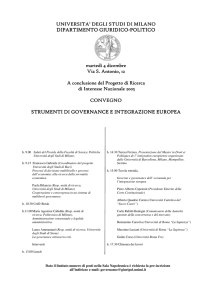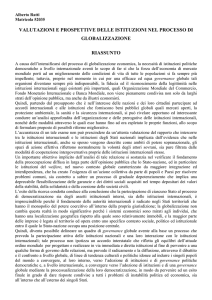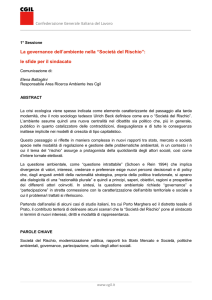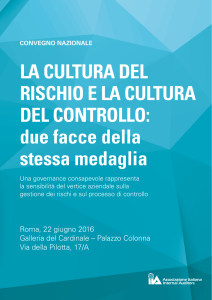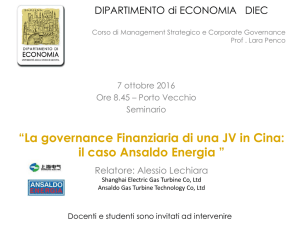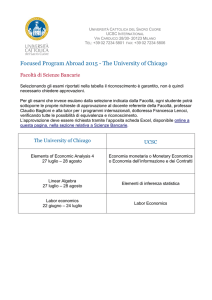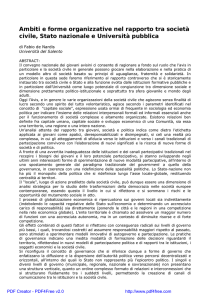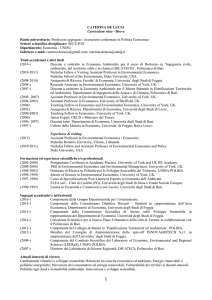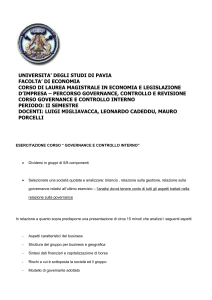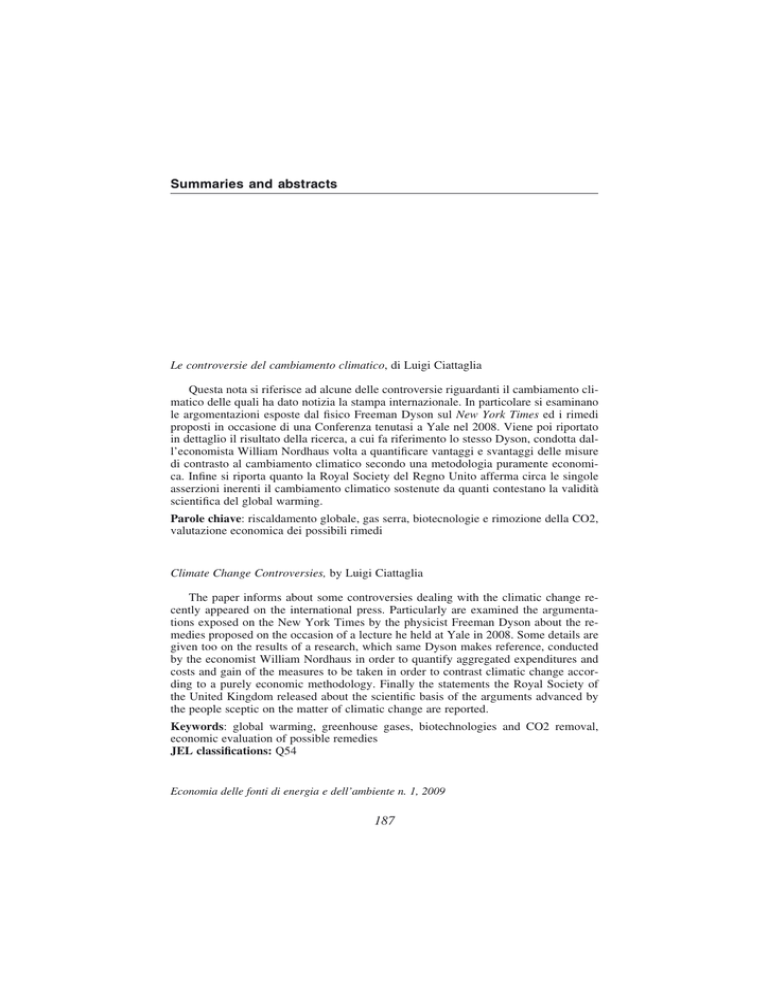
Summaries and abstracts
Le controversie del cambiamento climatico, di Luigi Ciattaglia
Questa nota si riferisce ad alcune delle controversie riguardanti il cambiamento climatico delle quali ha dato notizia la stampa internazionale. In particolare si esaminano
le argomentazioni esposte dal fisico Freeman Dyson sul New York Times ed i rimedi
proposti in occasione di una Conferenza tenutasi a Yale nel 2008. Viene poi riportato
in dettaglio il risultato della ricerca, a cui fa riferimento lo stesso Dyson, condotta dall’economista William Nordhaus volta a quantificare vantaggi e svantaggi delle misure
di contrasto al cambiamento climatico secondo una metodologia puramente economica. Infine si riporta quanto la Royal Society del Regno Unito afferma circa le singole
asserzioni inerenti il cambiamento climatico sostenute da quanti contestano la validità
scientifica del global warming.
Parole chiave: riscaldamento globale, gas serra, biotecnologie e rimozione della CO2,
valutazione economica dei possibili rimedi
Climate Change Controversies, by Luigi Ciattaglia
The paper informs about some controversies dealing with the climatic change recently appeared on the international press. Particularly are examined the argumentations exposed on the New York Times by the physicist Freeman Dyson about the remedies proposed on the occasion of a lecture he held at Yale in 2008. Some details are
given too on the results of a research, which same Dyson makes reference, conducted
by the economist William Nordhaus in order to quantify aggregated expenditures and
costs and gain of the measures to be taken in order to contrast climatic change according to a purely economic methodology. Finally the statements the Royal Society of
the United Kingdom released about the scientific basis of the arguments advanced by
the people sceptic on the matter of climatic change are reported.
Keywords: global warming, greenhouse gases, biotechnologies and CO2 removal,
economic evaluation of possible remedies
JEL classifications: Q54
Economia delle fonti di energia e dell’ambiente n. 1, 2009
187
L’economia ambientale eterodossa: filoni teorici alla ricerca di un paradigma, di Gerardo Marletto
L’economia ambientale eterodossa si basa principalmente su teorie economiche non
standard; in particolare, essa fa riferimento a due filoni classici di teoria economica (e
alla loro recente riaffermazione e fertilizzazione incrociata): l’economia istituzionale e
l’economia schumpeteriana. A partire da queste fondamenta teoriche, l’economia ambientale eterodossa si differenzia radicalmente dall’approccio ortodosso (basato sul mercato e statico) all’economia ambientale, positiva e normativa. Tre concetti base sono al
cuore di tale differente visione: i regimi delle risorse, considerati come strutture istituzionali create per regolare l’accesso alle risorse naturali e il loro sfruttamento; le valutazioni ambientali, considerata anch’esse come istituzioni, in questo caso necessarie per
gestire l’incommensurabilità di valori tra loro in conflitto; le transizioni socio-tecniche,
considerate come processi dinamici per uscire dall’intrappolamento in tecnologie, istituzioni e valori non sostenibili. Queste considerazioni non sono sufficienti per affermare
che l’economia ambientale eterodossa sia già un paradigma; una comunità stabile di ricercatori che considerano loro stessi come “economisti ambientali eterodossi” ancora
non esiste. Solo il tempo potrà dire se alcune connessioni tra gruppi di ricerca che si
sono rafforzate in questi anni daranno luogo al nucleo sociale di un paradigma nascente.
Heterodox Environmental Economics: Theoretical Strands in Search of a Paradigm,
by Gerardo Marletto
Heterodox environmental economics is mainly based on non-mainstream economic
theories; in particular it refers to two classic strands of economics (and to their recent
revival and cross-fertilization): institutional economics and Schumpeterian economics.
Starting from these theoretical foundations, heterodox environmental economics radically differs from the mainstream (market-centred and static) approach to positive and
normative environmental economics. Three basic concepts are at the hearth of such a
different vision: resource regimes, as institutional structures established to regulate access to natural resources and their use; environmental appraisals, as “value articulating” institutions conditioned by the incommensurability of conflicting values; “sociotechnical” transitions, as dynamic processes that are needed to unlock existing unsustainable technologies, institutions and values. These considerations are not sufficient
to say that heterodox environmental economics has already become a paradigm; a stable community of researchers defining themselves as ‘heterodox environmental economists’ still does not exist. Time will tell if some emerging connections between different research groups will generate the social core of a nascent paradigm.
Keywords: environmental economics; heterodox economics; institutional economics;
evolutionary theories of economic change
JEL classification: B52; Q50
Oltre la “tragedy of the commons”, di Xavier Basurto and Elinor Ostrom
Per fare un passo oltre la teoria della “tragedy of the commons” di Hardin è fondamentale evitare di cadere in due trappole analitiche e politiche: quella di andare alla ri-
188
cerca di “panacee” da raccomandare in ogni contesto, e quella opposta di asserire che
“ogni caso è unico e irripetibile”. È possibile superare entrambe le trappole attraverso
la costruzione auto-cosciente di una teoria diagnostica che aiuti a scomporre e comprendere le complesse interrelazioni tra i diversi fattori sociali e bio-fisici a differenti
livelli di analisi. È necessario guardare alle analogie e differenze tra i diversi casi.
Questa comprensione migliorerà se il ricco dettaglio di particolari prodotti nella ricerca basata su case-studies verrà utilizzata insieme a un approccio diretto alla ricerca di
strutture e schemi di classificazione. In questo lavoro, si applica questo approccio ad
uno studio diretto a diagnosticare le ragioni che hanno permesso il sorgere e il consolidarsi di un sistema auto-organizzato nella gestione delle risorse di pesca nel Golfo della California in Messico. Nel fare questo, si rifugge dall’approccio universalistico proposto da Hardin, per comprendere perché due delle tre zone di pesca sono state capaci
di auto organizzarsi con successo, e una di queste continua a mantenersi sostenibile anche nel lungo periodo.
Parole chiave: sviluppo sostenibile; risorse rinnovabili; zone di pesca; proprietà comuni
Beyond the Tragedy of the Commons, by Xavier Basurto and Elinor Ostrom
To move beyond Hardin’s tragedy of the commons, it is fundamental to avoid falling into either of two analytical and policy traps: deriving and recommending “panaceas” or asserting “my case is unique.” We can move beyond both traps by self-consciously building diagnostic theory to help unpack and understand the complex interrelationship between social and biophysical factors at different levels of analysis. We
need to look for commonalities and differences across studies. This understanding will
be augmented if the rich detail produced from case studies is used together with theory
to find patterned structures among cases. In this paper, we briefly illustrate important
steps of how we can go about diagnosing the emergence and sustainability of self-organization in the fishing context of the Gulf of California, Mexico. By doing so, we are
able to move away from the universality proposed by Hardin and understand how two
out of three fisheries were able to successfully self-organize, and why one of them continues to be robust over time.
Keywords: sustainable development; renewable resources fisheries; renewable resources commons
JEL classifications: QO1; Q20; D70
Governare l’ambiente: l’approccio dell’economia istituzionale, di Arild Vatn
L’analisi della governance ambientale implica soprattutto un’analisi delle strutture
istituzionali e delle loro implicazioni. Nel fare questo, il presente lavoro utilizza un approccio derivato dalla tradizione dell’economia istituzionale classica. L’articolo è
strutturato in tre parti. La prima parte descrive le principali caratteristiche dell’approccio classico e lo confronta brevemente con quello neoclassico e con la tradizione della
nuova economia istituzionale. Nella seconda parte si chiarisce il principale aspetto della governance vista da una prospettiva istituzionale. Nella terza parte, ci si sposta a
un’analisi più specifica della governance ambientale. Viene definito il concetto di “re-
189
gime istituzionale di accesso alle risorse”; si analizza poi in che modo le istituzioni influenzano la formazione e articolazione delle conoscenze e dei valori, in che modo
esse costituiscono e proteggono gli interessi dei diversi soggetti, in che modo influenzano i costi di transazione e quindi le possibilità di coordinamento tra gli attori, e infine come esse determinano le motivazioni alla base delle scelte degli attori economici
nei contesti concreti.
Parole chiave: economia istituzionale classica; interdipendenza; regimi istituzionali di
accesso alle risorse; articolazione del valore; protezione degli interessi; costi di transazione; razionalità multiple
Governing the Environment: The Institutional Economics Approach, by Arild Vatn
Analyzing environmental governance implies foremost to analyze institutional
structures and their implications. In doing so, the present paper utilizes insights primarily from the tradition of classical institutional economics. The paper is divided in three. In the first part I describe the main features of the classical position and compare it
briefly with that of neoclassical economics and the tradition of new institutional economics. In the second part I clarify what is considered the main aspects of governance
as seen from an institutional perspective. In part three I move to the more specific area
of environmental governance. The concept of resource regimes is defined. Moreover I
analyze how different regimes influence which environmental problems appear and
how they can be treated. I discuss how institutions influence the formation and articulation of knowledge and values, how they form and protect interests, how they influence the level of transaction costs and hence the possibilities for coordination, and finally how they form the motivations underlying human choices in concrete contexts.
Given that all these variables are shown to be endogenous to the institutional system, the use of comparative analysis in the assessment of various governance options
is emphasized.
Keywords: classical institutional economics, interdependence, resource regimes, value
articulation, interest protection, transaction costs, plural rationalities.
JEL classifications: B52; Q50; D02; D70.
Dai fallimenti del mercato a una teoria istituzionale della governance ambientale, di
Jouni Paavola
Questo lavoro esamina come una teoria istituzionale della governance ambientale
possa basarsi su una reinterpretazione e rielaborazione del paradigma dei fallimenti del
mercato e le principali critiche ad esso rivolte. Il lavoro esamina dapprima in dettaglio
i principali argomenti alla base del paradigma dei fallimenti del mercato a proposito di
esternalità e beni pubblici, così come le critiche ad essi rivolte. La teoria istituzionale
della governance ambientale riconosce l’interdipendenza tra attori economici e il risultante ruolo fondamentale dei conflitti come elemento alla radice del sorgere della governance ambientale e delle sue istituzioni. Essendo i conflitti ambientali principalmente una questione distributiva più che di efficienza allocativa, diventa importante
comprendere le probabili conseguenze delle alternative istituzionali nel contesto specifico, sia fisico che socio-economico, in cui il conflitto si svolge, e fino a che punto que-
190
ste conseguenze sono compatibili con gli obiettivi sociali ed economici rilevanti in ciascun contesto.
Parole chiave: governance ambientale; fallimenti del mercato; esternalità; beni pubblici; economia del benessere; economia istituzionale.
From Market Failure Paradigm to an Institutional Theory of Environmental Governance, by Jouni Paavola
This manuscript examines how an institutional theory of environmental governance might be based on a re-interpretation and re-working of the arguments of the market
failure paradigm and its main criticisms. The manuscript first examines in detail the arguments of the market failure paradigm regarding externalities and public goods, as
well as their criticisms. The paper then suggests an institutional re-interpretation and
revision of the key arguments of the market failure paradigm. The institutional theory
of environmental governance acknowledges the interdependence of economic actors
and the resulting fundamental role of conflicts as the rationale for environmental governance and its institutions. As environmental conflicts are primarily a matter of distribution rather than of efficiency, it becomes important to understand the likely consequences of institutional alternatives in the specific socio-economic and physical setting of the environmental conflicts, and the degree to which these consequences match
with the pertinent social or economic goals.
Keywords: environmental governance, market failure, externalities, public goods,
welfare economics, institutional economics
JEL classifications: Q50; H41; D62; B52
Eco-innovazione e transizioni, di René Kemp
Questo paper ha lo scopo di analizzare l’approccio all’innovazione di sistema e alla
trasformazione sociale per lo sviluppo sostenibile, che oggi è noto come “governo della transizione”. Dal punto di vista teorico, tale approccio si basa su tre elementi: i mercati; il loro orientamento, in termini di obiettivi e visioni per lo sviluppo sostenibile; la
combinazione tra auto-organizzazione e gestione delle reti sociali. Essendo basato su
un processo di variazione – selezione – ritenzione, il “governo della transizione” può
essere visto come governance evolutiva che: crea varietà indotte da visioni della sostenibilità; dà forma a nuovi sentieri di cambiamento; adatta i regimi istituzionali esistenti. È un modello per uscire dall’intrappolamento a muovere verso soluzioni che offrano
benefici diffusi, non solo per gli utenti, ma per la società nel suo insieme. Non è un
tentativo megalomane di controllare il futuro, ma l’orientamento dei processi evolutivi
sulla base di obiettivi individuati grazie ad una riflessione collettiva. La prospettiva
multi-livello sul cambiamento e il modello di orientamento agli obiettivi e di governance riflessiva – su cui si basa il “governo della transizione” – sono descritti nel paper. Sono analizzate anche alcune esperienze concrete di “governo della transizione”
realizzate nei Paesi Bassi, così come il dibattito internazionale sull’utilizzo di questo
originale approccio come modello per la governance dello sviluppo sostenibile.
191
Eco-Innovation and Transitions, by René Kemp
This paper is aimed at examining the scholarship on system innovation and societal transformation for sustainable development, which today is known as “transition
management”. In theoretical terms, the approach of transition management relies on
markets, guidance in the form of goals and visions of sustainable development,
network management with an element of self-organisation. Transition management
could be viewed as “evolutionary governance” as it is concerned with the functioning
of the variation-selection-retention process: creating variety informed by visions of the
sustainability, shaping new paths and reflexively adapting existing institutional frameworks and regimes. It is a model for escaping lock-in and moving towards solutions
offering multiple benefits, not just for users but also for society as a whole. It is not a
megalomaniac attempt to control the future but an attempt to insert normative goals
into evolutionary processes in a reflexive manner. The multilevel perspective of change and the model of goal-oriented modulation and reflexive governance, on which
transition management is based, are described. Experiences with transition management in the Netherlands are described too, as well as the international debate on transition management as a model of governance for sustainable development.
Keywords: eco-innovation, transition, reflexive governance, multi-level change, the
Netherlands
JEL classification: B52; Q50
Strategie di impresa in relazione al tema della tutela ambientale, di Damien Bazin
Le imprese hanno una reputazione che le vuole preoccuparsi solo del profitto e per
il fatto di avere scarsa considerazione delle conseguenze che le proprie azioni e comportamenti hanno sull’ambiente. Intendiamo proporre una visione innovativa dell’impresa, basata sul concetto di responsabilità sociale, nel quale si evidenzia come la dicotomia sopra evidenziata si manifesta in modo meno marcato. Si mostra che, affinché
la questione ambientale venga presa in seria considerazione, è necessario che essa venga affrontata come problema di cambiamento strutturale e strategico a un livello istituzionale. A questo proposito, si sviluppa una critica dello strumento della tassazione
ambientale, allargando poi il discorso, evidenziando la necessità di una maggiore responsabilizzazione degli agenti economici.
Parole chiave: responsabilità sociale di impresa, ambiente, comportamento responsabile, tassazione
Corporate Strategy in Relation to Environmental Protection Issues, by Damien Bazin
Firms have a reputation for caring only about profits and for showing scant regard
when it comes to the consequences of their actions or their behaviour in relation to environmental protection. We wish to put forward a renewed vision of firms in terms of
their corporate social responsibility, one in which the above dichotomy becomes less
marked. We will explain in detail the fact that in order to take environmental issues seriously, it is necessary to consider them with regard to corporate change at an institutional level. For this reason we will carry out a critical analysis of the use of an envi-
192
ronmental tax and we will broaden the discussion to include the need for a greater responsibility among economic agents.
Keywords: corporate social responsibility, environment, responsible behaviour, taxation.
JEL classification: Q010, Q560, Q580
GNL, competizione e sicurezza di approvvigionamento: il segmento dello shipping, di
Susanna Dorigoni, Luigi Mazzei, Federico Pontoni e Antonio Sileo
Negli ultimi anni, l’Unione Europea ha individuato come problema prioritario, in
ambito energetico, la salvaguardia della sicurezza e dell’economicità delle forniture.
Nel settore del gas naturale, un ruolo importante può essere giocato dal ricorso alle importazioni via GNL, che rendono possibile l’approvvigionamento da un maggior numero di paesi produttori, richiedendo al contempo investimenti meno specifici di quelli nella costruzione di pipeline. Spesso la letteratura si è occupata delle due fasi estreme della filiera (liquefazione e rigassificazione), mentre poca attenzione è stata rivolta
finora sulla fase intermedia, quella dello shipping, che pure gioca un ruolo importante
nelle dinamiche del settore. Infatti, come naturale, le dinamiche di questo segmento
della filiera condizionano e vengono condizionate da quelle degli altri due, in particolare della rigassificazione. Questo saggio intende colmare questa lacuna, presentando,
dopo uno sguardo all’intero mercato del GNL, un’analisi della flotta mondiale di navi
gasiere (attuale e prospettica), ed in particolare delle loro dimensioni, delle tratte a cui
sono deputate e della relativa situazione contrattuale. L’analisi statistica su di un ricco
database di navi permetterà alcune interessanti indicazioni sull’intero mercato del
GNL.
Parole chiave: GNL, navi gasiere, sicurezza dell’approvvigionamento, competizione,
rigassificatori, mercato spot, commercio internazionale di gas naturale.
LNG, Competition and Security of Supply: the Role of Shipping, by Susanna Dorigoni,
Luigi Mazzei, Federico Pontoni and Antonio Sileo
In the last few years, one of the main concerns of European Union in the energetic
field has been that of facilitating the safeguard of raw materials’ security of supply,
especially that of natural gas.
Import through LNG chain, that is, through the employment of LNG tankers for
gas transportation, has been identified by the European Council as one of the instruments to achieve these goals. In fact, import via LNG does not require, for the importer, such investments as to determine an indissoluble physical tie between producer
and buyer, as happens for transport via pipeline (Chernyavs’ka et al., 2002). In other
words, investments in pipelines are very specific. Moreover, as they are made in order
to support specific transactions, contracts usually take the form of long-term agreements with minimum offtake requirements (take or pay clauses): such contracts definitely contribute to the “cartelization” of the market, hindering competition.
Unlike investments in pipelines, those in the LNG chain present a much lower degree of specificity: in fact, even though the construction of a regasification plant is generally tied to the stipulation of a long-term agreement (with take or pay clause), LNG
193
chain costs have significantly decreased over time (until a few years ago) and, moreover, it is getting increasingly common that part of plant capacity is made available for
spot transactions. What’s more, once the contract is expired and the investment is
sunk, the importer may satisfy his gas supply needs on the basis of his relative gains.
As far as LNG import contractual practices are concerned, significant changes have
started to take places in the last few years, both in terms of agreements’ length – average duration has significantly decreased – and in terms of price indexation – in the
most developed markets LNG price is tied to gas spot price (IEA, 2006).
One of the many possible advantages of transport via LNG is that liquefied gas
enables European importers to widen their gas suppliers portfolio. Increased possibilities of choice for importers, the widening of the group of exporting countries, and the
increased integration of the European market, thanks to the possibility of redirecting
cargoes depending on single countries’ supply-demand balance, would contribute decisively to security of supply, market globalization and competition (between importers)
in the industry (IEA, 2004). Yet, it must be stressed that import via tanker appears to
be competitive with import via pipe only for the medium-long distances.
As far as LNG chain is concerned, the element that so far has attracted the least attention, though being not less important than the other two, is certainly shipping.
Being the link between the producing/exporting country and the importing country,
and having been subject to major changes in the last few years, it is particularly interesting to analyze it singularly, aiming to understand how it is linked to the other elements of LNG value chain, besides studying industry dynamics.
This paper will address this issue, aiming also to understand what has been and
what will be in the future the evolutionary trajectory of this segment, starting from an
analysis of operative and planned gas tankers, their size, their routes and their contractual situation. This analysis can be useful to make hypothesis about the growth of the
spot market and, consequently, of market liquidity.
Keywords: LNG, gas tankers, security of supply, competition, regasification plants,
spot market, natural gas international trade
JEL classifications: L95, K12, F14, L11
Un’analisi sulla gestione dei rifiuti urbani nei comuni capoluogo di provincia, di Filippo Vergara Caffarelli
Efficacia, efficienza ed economicità sono tra i criteri cui dovrebbe conformarsi lo
svolgimento della raccolta dei rifiuti solidi urbani, come stabilito fin dal decreto Ronchi del 1997. Questo lavoro presenta un’analisi della performance economica dei gestori del servizio di raccolta nei comuni capoluogo di provincia italiani basata sui dati
contabili delle aziende. Attraverso la costruzione di alcuni indici di bilancio, sono investigate le caratteristiche principali di tali gestori in termini di struttura patrimoniale,
redditività, formazione del valore aggiunto, produttività, investimenti e sviluppo aziendale. Lo scopo è verificare, tramite la valutazione degli effetti della specializzazione,
della localizzazione territoriale, dell’evoluzione temporale, della dimensione e della
forma giuridica delle imprese e della remunerazione del servizio di raccolta, fino a che
punto il settore abbia assunto le auspicate caratteristiche industriali. Il quadro che
emerge dall’analisi empirica rappresenta un comparto ancora fortemente arretrato, ove
spiccano l’elevata disomogeneità tra le imprese, la maggiore redditività delle multiutility rispetto alle aziende specializzate e una penalizzazione delle imprese localizzate
194
nel Mezzogiorno. L’adozione della tariffa ambientale ha un effetto ambiguo: sembrerebbe incidere positivamente sull’efficienza operativa e sulla produttività, senza tuttavia incrementare la redditività del capitale. Il raggiungimento degli obiettivi di “industrializzazione” del comparto dei rifiuti appare alla luce di questo lavoro ancora complessivamente lontano.
Parole chiave: servizi pubblici locali, gestione dei rifiuti urbani, regolamentazione
Waste Management in Italy: an Analysis of City-Level Data, by Filippo Vergara Caffarelli
Effectiveness, efficiency and affordability have been among the key criteria for
municipal solid waste management in the Italian legal framework since the so-called
“Ronchi Decree” of 1997. The paper analyses the economic performance of waste-collection firms in Italy. We construct a dataset that includes almost all the companies
performing waste collection in the provincial capitals of Italy. We investigate their capital structure, profitability, value added, productivity, investment and business development by means of a set of financial ratios. The research is developed through the assessment of the effects on firms’ performance of specialisation, localisation, temporal
evolution, size and legal form of firms and the remuneration system for waste collection. The aim of this paper is twofold. First, given the almost universal nature of the
sample under investigation, we describe the economic and financial structure of waste
collection firms in Italy; second, we empirically evaluate the extent to which the sector
has taken on the industrial characteristics set forward in the legal framework. Hence
the analysis is conducted both at sector level and at firm level. At the aggregate level,
it is possible to identify a trend for the sector as a whole towards convergence with the
rest of the economy. However, waste management still displays clear signs of
backwardness, especially due to weaker financial structure, higher incidence of labour
costs on value added and lower investment. Firm-level data are analysed with both
univariate and multivariate statistical techniques. The results confirm the general
backwardness of the sector, with businesses located in Southern part of Italy lagging
even further behind. Moreover, firms simultaneously providing multiple utility services are more profitable than those specialized in the waste sector only. However this
appears attributable to cross-subsidisation between services, not economies of scope.
Both scale of operations and legal form have a positive impact on firms’ profitability,
thanks in part to a negative correlation with degree of specialisation. Moreover, the
economic performance of waste management firms is significantly pro-cyclical. Finally, the new cost-based remuneration system for collection services produces ambiguous results. It has a positive effect on operational efficiency and productivity but
does not increase the return on capital. A simple econometric model is estimated to
evaluate the simultaneous impact on firms’ performance of specialisation, localisation,
temporal evolution, size, legal form and remuneration system, confirming the outcome
of the univariate analysis. In the light of our results, the successful “industrialization”
of the waste management sector appears still far away.
Keywords: local public services, waste management, regulation
JEL classifications: L32, L51, Q53
195

